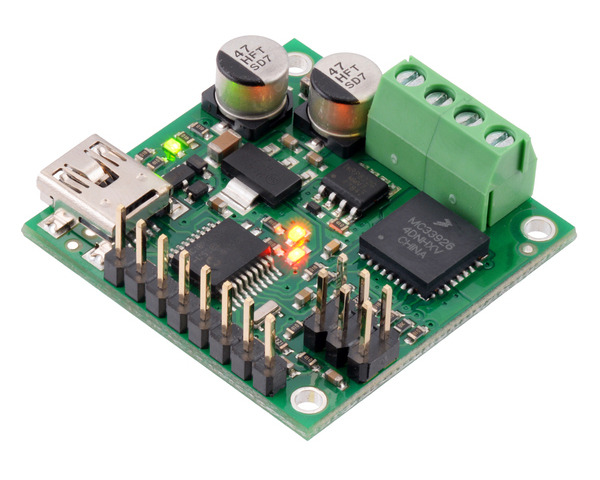Motion Control Modules » Brushed DC Motor Controllers » Pololu Jrk Motor Controllers with Feedback »
Jrk 21v3 USB Motor Controller with Feedback (Connectors Soldered)
The Jrk 21v3 motor controller is a highly configurable brushed DC motor controller that supports four interface modes: USB, logic-level serial, analog voltage, and hobby radio control (RC). The controller can be used with feedback for closed-loop speed or position control, or it can be used without feedback as an open-loop speed control. The continuous output current is approximately 3 A in the recommended operating range of 8 V to 28 V, with derated performance down to 5 V and transient protection to 40 V. This version ships with connectors installed as shown (no soldering required).
Alternatives available with variations in these parameter(s): version Select variant…
 Compare all products in Pololu Jrk Motor Controllers with Feedback.
Compare all products in Pololu Jrk Motor Controllers with Feedback.
| Description | Specs (15) | Pictures (21) | Resources (11) | FAQs (2) | On the blog (1) | Distributors (14) |
|---|
- Why is the Jrk not driving my motor?
- There might be an error preventing the Jrk from driving the motor; check the Errors tab in the configuration utility. If you are trying to use a feedback mode, make sure that you have entered some non-zero PID constants (good starting values are Proportional=1, Integral=0, Derivative=0) and make sure there is a large difference between the values of the Target and Feedback variables. If you are trying to use the no-feedback (speed control) mode, then make sure that the target is not close to 2048 (speed 0); try setting the target to 2648 (full speed forward). In either case, you should look at the graph and make sure that the Duty Cycle is not close to 0; try to get it closer to +600 or -600 (full speed forward or full speed reverse).
- Does the Jrk support using a quadrature encoder for feedback?
- The Jrk motor controllers do not work with encoders, in the sense that you cannot get position control over unlimited number of rotations. (The Jrks are typically used with potentiometer feedback, which allows for up to a few rotations when using multi-turn potentiometers.)



























